Countdown to Copenhagen
Air Date: Week of June 12, 2009
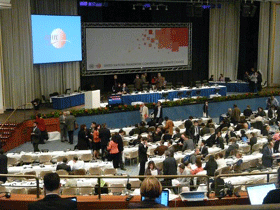
International negotiations on climate change in Bonn, Germany.
Scientists say huge cuts are needed to avoid dangerous disruption of our climate. But delegates gathered in Bonn to craft the first phases of a new climate treaty made little progress, with major polluters, the U.S. and China, unable to reach agreement. But, as Living on Earth’s Bruce Gellerman tells host Steve Curwood, there does seem to be some good news for developing nations: direct aid, in the form of hundreds of billions of dollars and technology, is on the table to help poor nations adapt to climate disruption.
Transcript
YOUNG: From the Jennifer and Ted Stanley studios in Somerville, Massachusetts, this is Living on Earth. I’m Jeff Young.
CURWOOD: And I’m Steve Curwood.
In December the nations of the world are planning to gather in Copenhagen to come to a new agreement to fight climate change. The Kyoto Protocol expires in 2012. In the beginning of June, delegates came to Bonn, Germany for a two-week meeting intended to hammer out some details of a new deal. And Living on Earth’s Bruce Gellerman joins me now from Bonn. Hi there Bruce.
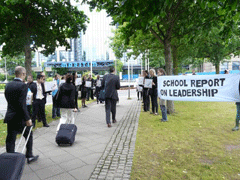
UNFCCC Delegates are welcomed by demonstrators in Bonn, Germany. (Photo: Bruce Gellerman)
CURWOOD: So Bruce, this meeting is now the second in a series of five leading up to Copenhagen in December--- and I think the UN set up so many meetings because they easily get bogged down and need a lot of time. What kind of progress was there this time?
GELLERMAN: Well, for the first time there is a working draft of the text of a proposed climate treaty, and that’s a big deal. And delegates have been scrutinizing every word and every punctuation mark. But the problems at this stage aren't with the details. I spoke with Jennifer Morgan - she's director for the global climate change program at the European environmental think-tank called E3G.
MORGAN: I think there was progress just in moving forward on getting that text ready and discussing and understanding country positions but as far as making progress to really solving the problem and seeing signals from the big polluting countries that they're going to do something significant, no.
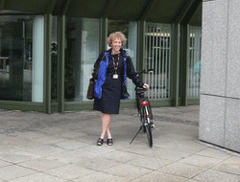
Jennifer Morgan, director of global climate change for E3G, in front of the UN Environment Building in Bonn. (Photo: Bruce Gellerman)
GELLERMAN: Well, there are two major issues - A - the big industrial countries - the ones in the Northern Hemisphere that Jennifer Morgan calls the big polluters - the question for them is: how much are they willing to cut greenhouse gas emissions, and B - money and technology - how much support will these big nations provide, you know, the developing countries.. To help them confront and adapt to climate change...change, which they say industrial nations caused.
CURWOOD: So, how now does the U.S. fit into this?
GELLERMAN: Well, under the Waxman Markey Bill, which is making its way through Congress, the United States would make domestic emissions reductions about 4 percent below 1990 levels – now you might recall Steve the Kyoto Protocol, which the United States signed that way back when, but never ratified the calls for cuts to seven percent below 1990, so the United States has slid backwards in the eyes of some.
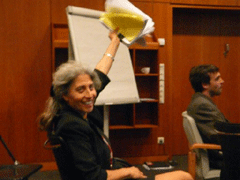
Annie Petsonk from the Environmental Defense Fund waves a copy of the Waxman-Markey climate change bill at the meetings in Bonn.
ESSOP: What did not help of course was Japan's announcement in the plenary about their targets. This was a real trust killer. Japan chose to make the announcement in the plenary in front of vulnerable countries, and clearly the kind of targets they placed on the table takes us on an emission a pathway up to three degrees or beyond.
CURWOOD: So, she’s talking about three degrees of global warming. Scientists say we’re gonna be in deep trouble if we have more than two degrees.
GELLERMAN: Yes, floods and climate change could be cataclysmic. But you know it’s still early on and Yvo de Boer, who’s the Executive Secretary of the UN Climate Organization, says he is not about to give up.
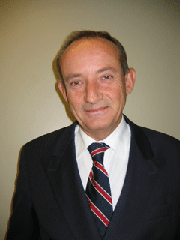
Yvo de Boer is the the Executive Secretary of the UNFCCC. (Courtesy the United Nations)
CURWOOD: And how much money on the table are they talking about, I mean how ambitious, is ambitious?
GELLERMAN: Sit down Steve! 250 billion dollars a year to help poor nations - that does include direct aid and the transfer of high tech technology.
CURWOOD: They're going to need a very big table!
GELLERMAN: Yeah, and there are a number of formulas and ways the negotiators are going to come up with it – here’s Yvo De Boer again.
DE BOER: At the end of the day, it always comes out of the taxpayer’s pocket. I hope that we will find a formula that basically follows the polluter-pays principle, and as far as I’m concerned, you can eat strawberries in the dead of winter, providing that you pay the environmental cost associated with getting those strawberries to you at that unsustainable moment in time.

A sign posted near the UNFCCC meeting. (Photo: Bruce Gellerman)
GELLERMAN: Exactly, that’s the idea - and while the United States is the richest nation, China recently surpassed us as the number one polluter of greenhouse gases - which was why all the negotiators here in Bonn were talking about the bi-lateral negotiations going on between the United States and China in Beijing.
I spoke with Jonathan Pershing; he’s the deputy special envoy for climate change in the State Dept. He just flew into Bonn right from Beijing.
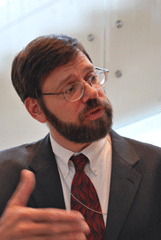
Jonathan Pershing.
CURWOOD: Bruce, before you go, tell about the speculation around President Obama coming to Copenhagen.
GELLERMAN: Yes, there was a lot of talk about that - which is why I asked Yvo de Boer, the executive Secretary of the UN Framework on Climate Change, if he thought President Obama would show up in Copenhagen in December for the final negotiations.
DE BOER: I think it would help a lot because Mr. Obama would come to celebrate success, so his arrival would be the signal of that.
GELLERMAN: Do you expect to see him there?
DE BOER: I don’t know.
GELLERMAN: I guess the question is “Do you expect to be successful?”
DE BOER: Um, I expect to be successful. I think we have to be successful. I think that Copenhagen is a unique moment in time that the world is looking for an answer there. What we’re still lacking is the Paul Revere who can ride out and get us the answer in Copenhagen. That’s why I’m calling for political leadership, but I think it will be done.
GELLERMAN: I can just see it - President Obama riding a horse through the streets of Copenhagen yelling, “Climate change is coming - climate change is coming!”
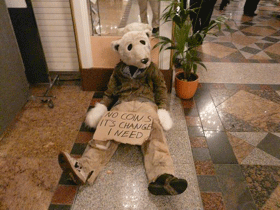
A protester asks for change. (Photo: Bruce Gellerman)
GELLERMAN: There are three more rounds of UN talks - this summer and fall: Bonn, Bangkok and Barcelona. But the real action will be in Italy next month when the world’s wealthiest nations meet, and then in September when heads of state meet at the UN in New York - and then there's another big meeting in Pittsburg – and then on to Copenhagen in December.
CURWOOD: Thanks Bruce.
GELLERMAN: My pleasure Steve.
CURWOOD: Living on Earth's Bruce Gellerman at the UN Climate negotiations in Bonn, Germany.
Links
Read the UNFCCC draft negotiating text.
Living on Earth wants to hear from you!
Living on Earth
62 Calef Highway, Suite 212
Lee, NH 03861
Telephone: 617-287-4121
E-mail: comments@loe.org
Newsletter [Click here]
Donate to Living on Earth!
Living on Earth is an independent media program and relies entirely on contributions from listeners and institutions supporting public service. Please donate now to preserve an independent environmental voice.
NewsletterLiving on Earth offers a weekly delivery of the show's rundown to your mailbox. Sign up for our newsletter today!
 Sailors For The Sea: Be the change you want to sea.
Sailors For The Sea: Be the change you want to sea.
 The Grantham Foundation for the Protection of the Environment: Committed to protecting and improving the health of the global environment.
The Grantham Foundation for the Protection of the Environment: Committed to protecting and improving the health of the global environment.
 Contribute to Living on Earth and receive, as our gift to you, an archival print of one of Mark Seth Lender's extraordinary wildlife photographs. Follow the link to see Mark's current collection of photographs.
Contribute to Living on Earth and receive, as our gift to you, an archival print of one of Mark Seth Lender's extraordinary wildlife photographs. Follow the link to see Mark's current collection of photographs.
 Buy a signed copy of Mark Seth Lender's book Smeagull the Seagull & support Living on Earth
Buy a signed copy of Mark Seth Lender's book Smeagull the Seagull & support Living on Earth

